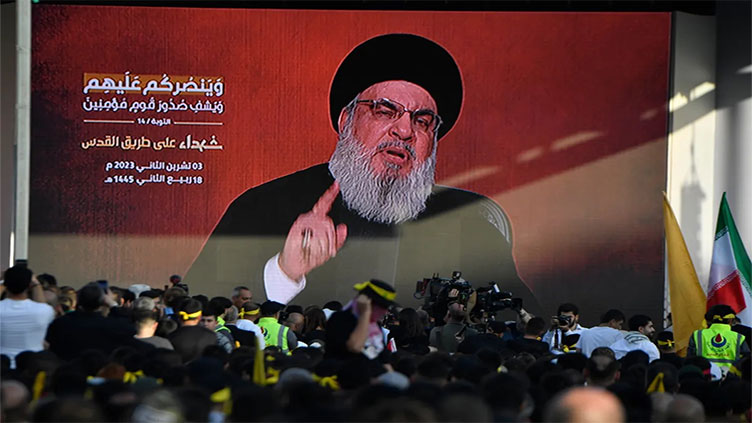Hezbollah pledges to respond alone or with allies to Israeli killing of commander

World
Sayyed Hassan Nasrallah said Hezbollah would wait for the right moment to respond.
BEIRUT (Reuters) - The leader of Hezbollah on Tuesday (Aug 6) pledged a "strong and effective" response to the killing of its military commander by Israel last week no matter the consequences and said Hezbollah would act either alone or with its regional allies.
Sayyed Hassan Nasrallah said Hezbollah would wait for the right moment to respond but did not hint at its form or timing.
All international attempts at persuading Hezbollah not to retaliate were futile, he said.
"Whatever the consequences, the resistance will not let these Israeli attacks pass by," he said in a televised address to mark one week since the assassination of Hezbollah military commander Fuad Shukr in Beirut.
"Our response, God willing, will be strong, effective and impactful," he said in a speech that was met with cheers from members and supporters of Hezbollah who gathered to watch in Beirut's southern suburbs.
Just before the speech began, Israeli warplanes swooped low over the Lebanese capital, setting off a series of sonic booms that rattled windows across the city and sent people ducking for cover. Nasrallah began by saying these were "small-minded" attempts by Israel to provoke people.
There was no comment from the Israeli military.
Concern is rising that the Middle East could tip into full-blown war following Hezbollah's vows to avenge Shukr's killing, and Iran's anger over the assassination in Tehran last week of the head of Palestinian militant group Hamas.
Iran has blamed Israel while Israel has not confirmed or denied involvement.
Describing the twin killings as clear "Israeli achievements" Nasrallah said they should not be taken as a sign the tide of the conflict was turning against Iran's Axis of Resistance. "Take it easy," he said.
He said Hezbollah had tried to prevent fighting with Israel from spreading beyond the border area to the rest of Lebanon, where summer parties have continued and vacationers were still arriving in throngs until last week.
But "the Israelis are the ones that chose this escalation with Lebanon", Nasrallah said.
"Nobody in Lebanon or abroad can ask us to deal with the aggression that happened last Tuesday as a normal aggression within the context of the battle that has been going on for 10 months," he said.
FIGHTING GOES ON
The strike that killed Shukr on July 30 was the second time Israel had struck the southern suburbs throughout the hostilities between Hezbollah and Israel that are taking place in parallel with the war in Gaza between Israel and Hamas.
Hezbollah earlier on Tuesday said it launched attack drones at two military sites near Acre in northern Israel and attacked an Israeli military vehicle in another location.
The Israeli military said a number of hostile drones were identified crossing from Lebanon and one was intercepted.
Israeli medical officials said seven people were evacuated to a hospital, to the south of the coastal city of Nahariya, one in critical condition.
The Israeli military said an initial investigation indicated the injuries were caused by an interceptor that "missed the target and hit the ground, injuring several civilians".
Reuters journalists saw one impact site near a bus stop on a main road outside Nahariya.
Earlier on Tuesday, four Hezbollah fighters were killed in a strike on a home in the Lebanese town of Mayfadoun, nearly 30km north of the border, medics and a security source said.
Nasrallah said these tit-for-tat attacks were part of regular fighting since October 2023 to support Palestinians in Gaza and the Israeli-occupied West Bank.
He said the response to the twin killing of top Hezbollah and Hamas figures would be more powerful but that delaying it was part of a strategy to exert psychological pressure on Israel.
"Iran will respond and Hezbollah will respond and the enemy waits... Making the enemy wait is part of the punishment," he said.


